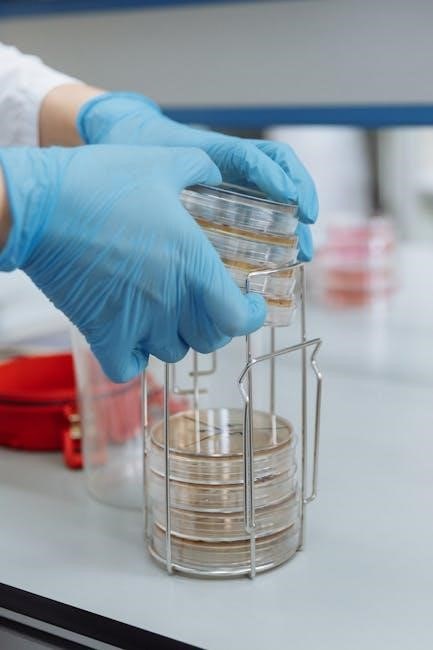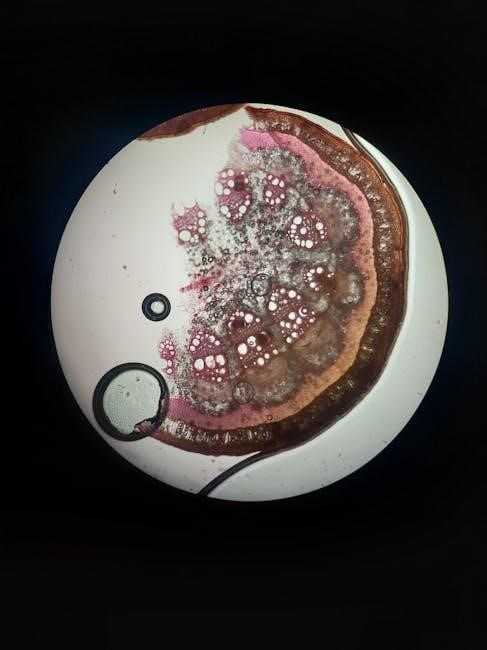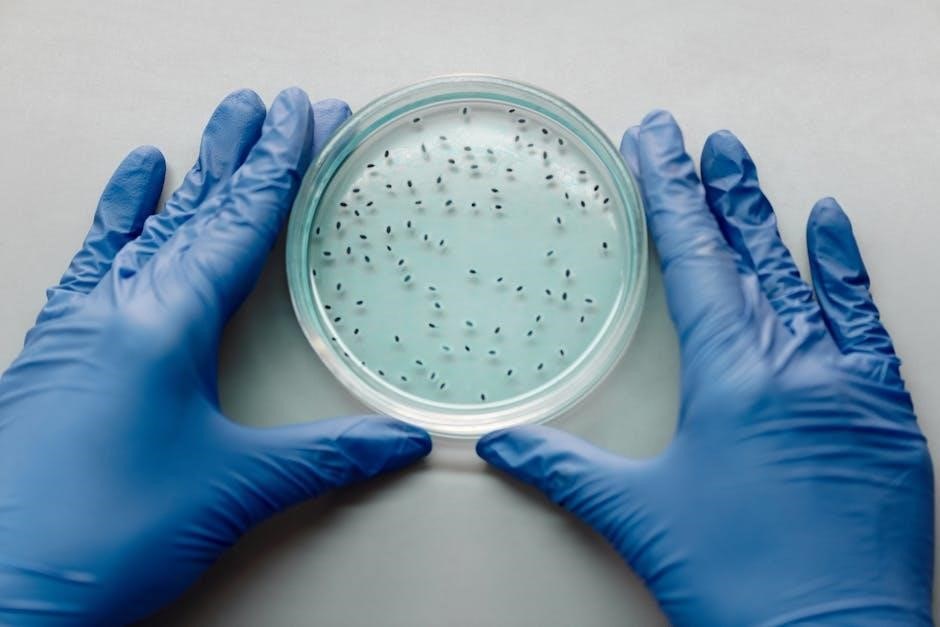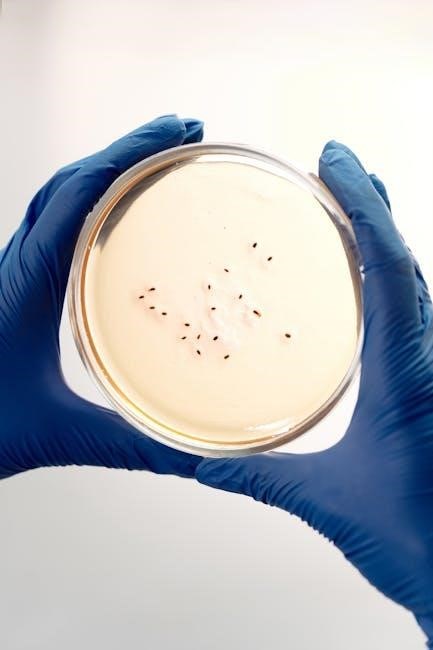Brock’s Biology of Microorganisms is a cornerstone text that provides a comprehensive overview of microbial biology, emphasizing principles and applications. It explores microbial diversity, genetics, and physiology, while highlighting the human microbiome and recent advances in metagenomics. This seminal work remains a vital resource for both students and researchers, offering insights into the intricate world of microorganisms and their impact on global health and ecosystems.

Overview of the Book
Brock’s Biology of Microorganisms is a foundational textbook that provides an in-depth exploration of microbial biology. Now in its 15th edition, the book seamlessly integrates cutting-edge research, particularly in molecular biology and genomics. It covers a wide range of topics, including microbial evolution, genetics, physiology, and the human microbiome. The text is renowned for its clear and engaging presentation, making complex concepts accessible to students and researchers alike. With a focus on both theoretical and practical aspects, it remains an essential resource for understanding the diverse and dynamic world of microorganisms. The book’s comprehensive approach ensures it is widely used in microbiology education and research globally.
Importance of Microbiology in Understanding Infectious Diseases
Microbiology plays a pivotal role in understanding infectious diseases by uncovering the mechanisms through which pathogens interact with their hosts. Brock’s Biology of Microorganisms emphasizes how microbial biology is essential for identifying the causes of diseases and developing effective treatments. By studying microbial genetics, physiology, and immune evasion strategies, scientists can design targeted therapies and vaccines. The book highlights the global impact of infectious diseases, underscoring the need for continued research in microbiology to combat emerging pathogens and antibiotic resistance. This knowledge is critical for public health, enabling the development of strategies to prevent and control disease outbreaks worldwide. Microbiology’s insights are indispensable in this fight.

Key Topics Covered in Brock’s Biology of Microorganisms
Brock’s Biology of Microorganisms covers microbial evolution, diversity, genetics, and physiology. It explores the human microbiome, metagenomics, and biotechnological applications, providing a robust foundation for microbiology.
Microbial Evolution and Diversity

Brock’s Biology of Microorganisms delves into the evolutionary history of microorganisms, exploring how they adapt and thrive in diverse environments. It examines the genetic mechanisms driving microbial evolution, such as horizontal gene transfer, and highlights the vast diversity of microbial life, from extremophiles like thermophiles and halophiles to symbiotic relationships in ecosystems. The text emphasizes how understanding microbial diversity is crucial for advancing biotechnology, medicine, and environmental science, offering a detailed look at the complex interactions that shape microbial communities.
Microbial Genetics and Molecular Biology
Brock’s Biology of Microorganisms explores the genetic and molecular mechanisms that drive microbial life, focusing on how microorganisms adapt, reproduce, and interact with their environments. The text delves into key topics such as genetic regulation, horizontal gene transfer, and the role of CRISPR systems in microbial defense. It also examines how advances in genomics and metagenomics have revolutionized the study of microbial communities. By integrating cutting-edge research, the book provides a detailed understanding of the molecular tools and techniques used to study microorganisms, offering insights into their genetic diversity and evolutionary adaptability.
Microbial Physiology and Metabolism
Microbial physiology and metabolism are central to understanding how microorganisms function and interact with their environments. Brock’s Biology of Microorganisms delves into the diverse metabolic processes that enable microbes to thrive in various ecological niches. The text explores how microorganisms utilize nutrients, produce energy, and synthesize essential molecules. It also highlights the unique metabolic adaptations of extremophiles and the role of microbial consortia in complex ecosystems. By examining metabolic pathways and their regulation, the book provides insights into the remarkable efficiency and versatility of microbial life, emphasizing their critical role in global nutrient cycling and biogeochemical processes.
The Human Microbiome
The human microbiome plays a crucial role in health and disease, with microbiota contributing to digestion, immunity, and overall well-being. Brock’s text explores its complex dynamics and recent metagenomic discoveries.
Role of Microbiota in Human Health
The microbiota plays a vital role in human health, contributing to digestion, immune system function, and overall well-being. Brock’s text highlights how these microorganisms aid in nutrient absorption, produce essential vitamins, and protect against pathogens. Imbalances in microbiota, known as dysbiosis, are linked to various diseases, including gastrointestinal disorders and autoimmune conditions. Understanding the complex interactions between microbiota and the human body is crucial for developing therapeutic interventions. The book emphasizes the importance of maintaining a healthy microbial balance to prevent and manage diseases, showcasing the profound impact of microbiota on human health and disease prevention.
Recent Advances in Metagenomics and the Human Virome
Recent advances in metagenomics have revolutionized the study of the human virome, enabling researchers to identify and characterize viral communities within the body. Brock’s text highlights how metagenomic techniques, such as next-generation sequencing, have uncovered the vast diversity of viruses, including those previously unknown. These discoveries have shed light on the role of viruses in human health and disease, revealing both harmful and beneficial interactions. The integration of metagenomics in understanding the human virome has opened new avenues for therapeutic interventions and personalized medicine, marking a significant milestone in microbiological research and its applications in human health.

Applications of Microbiology in Science and Industry
Microbiology drives advancements in biotechnology, environmental cleanup, and pharmaceutical production. Microorganisms are harnessed for biofuel creation, pollution remediation, and synthesizing valuable compounds, showcasing their industrial and scientific significance.
Biotechnological Applications of Microorganisms
Microorganisms are pivotal in biotechnology, driving innovations in medicine, agriculture, and industry. They are used to produce antibiotics, vaccines, and enzymes, revolutionizing healthcare and manufacturing processes. Genetic engineering has further enhanced their utility, enabling the creation of biofuels, bioproducts, and personalized medicines. Brock’s text highlights how these microbes are engineered to perform specific tasks, such as cleaning environmental pollutants through bioremediation. The genomic revolution has also opened doors to understanding microbial metabolism, leading to breakthroughs in synthetic biology. These applications underscore the transformative potential of microorganisms in addressing global challenges and advancing modern science.
Environmental Microbiology and Bioremediation
Environmental microbiology explores the roles of microorganisms in ecosystems, emphasizing their potential to address environmental challenges. Bioremediation, a key application, leverages microbes to degrade pollutants like oil spills and toxic chemicals. Brock’s text highlights how microbial communities can clean contaminated soils and waters, showcasing their ecological importance. Advances in molecular biology have enhanced our ability to engineer microbes for targeted bioremediation. These techniques not only mitigate environmental damage but also promote sustainable practices, making them indispensable in modern environmental science and conservation efforts.
Study Resources and Supplements
Supplemental materials, such as the Brock Microbiology Study Guide, offer in-depth support for understanding complex concepts. Digital versions and lab manuals further enhance practical learning experiences.
Utilizing the Brock Microbiology Study Guide
The Brock Microbiology Study Guide is an essential companion for mastering the principles of microbiology. It provides detailed summaries, practice problems, and critical thinking exercises tailored to reinforce key concepts from the main textbook. Students can benefit from chapter-specific study aids, including review questions and laboratory exercises, designed to deepen understanding of microbial diversity, genetics, and physiology. The guide also offers practical tips for preparing for exams and applying theoretical knowledge in real-world scenarios. By integrating this resource into their study routine, learners can enhance their grasp of complex topics and develop a stronger foundation in microbiology.
Accessing Digital Versions and Lab Manuals
Digital versions of Brock’s Biology of Microorganisms are available through platforms like Chegg and Amazon, with rental options starting at $28. While free PDF versions are difficult to find, the 13th edition can be accessed in digital format. Lab manuals, such as the one for Biol 552, provide practical exercises and training in microbiology fundamentals. These resources are designed to complement the textbook, offering hands-on experience with microorganisms. Students can also utilize supplementary materials, including study guides and online resources, to enhance their learning experience. Digital access ensures convenience and up-to-date content, making it easier for students to engage with the material effectively.
Brock’s Biology of Microorganisms remains a foundational text, shaping modern microbiology. Its integration of molecular biology and genomic insights continues to inspire future research and scientific advancements.

Future Directions in Microbiology Research
Future microbiology research will focus on advancing molecular biology, genomics, and metagenomics to explore microbial diversity and interactions. The human virome and microbial consortia will be key areas of study, leveraging metagenomics for discoveries. Environmental microbiology will address bioremediation and ecosystem health. Brock’s text underscores the importance of these directions, guiding researchers toward innovative solutions in global health and sustainability. By integrating cutting-edge technologies, microbiology continues to unravel the complexities of microbial worlds, paving the way for groundbreaking advancements in science and industry;
The Impact of Brock’s Biology of Microorganisms on Modern Science
Brock’s Biology of Microorganisms has profoundly shaped modern microbiology by integrating molecular biology, genomics, and microbial ecology. Its comprehensive approach has influenced research and education, inspiring advancements in biotechnology, environmental science, and public health. The text’s emphasis on microbial diversity and the human microbiome has driven innovations in metagenomics and disease understanding. By bridging foundational concepts with cutting-edge discoveries, it remains a cornerstone for scientists and educators, fostering a deeper appreciation of microorganisms’ roles in ecosystems and human life. Its legacy continues to empower future generations to explore and address global challenges through microbial science.

Leave a Reply
You must be logged in to post a comment.